South Korea: Seoul
-
 Aiden Trigg-HaugerAiden Trigg-Hauger
Aiden Trigg-HaugerAiden Trigg-Hauger -
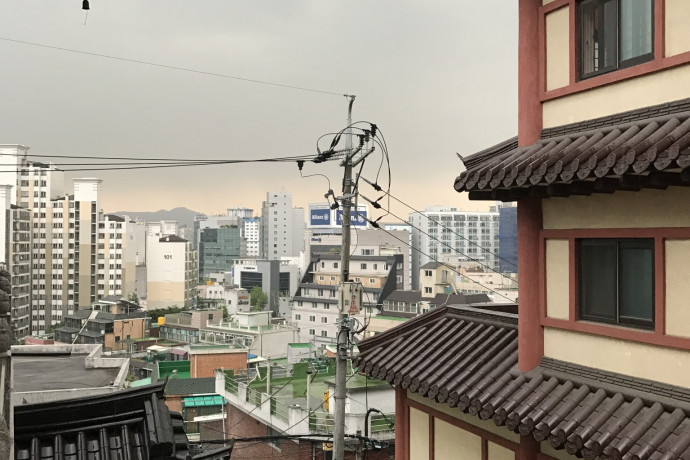 Caetano KjelstromCaetano Kjelstrom
Caetano KjelstromCaetano Kjelstrom -
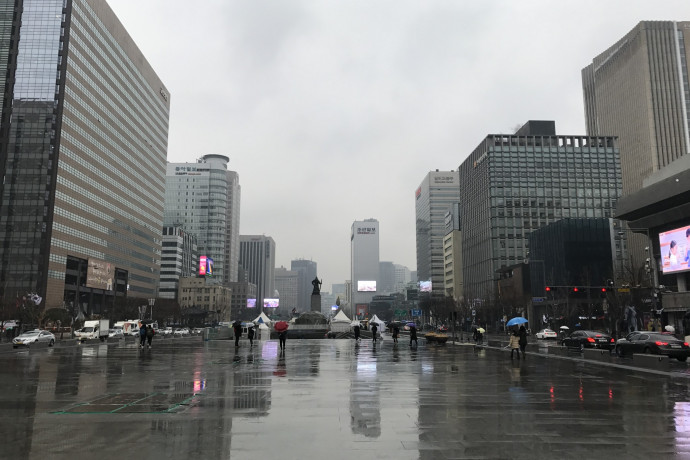 Caetano KjelstromCaetano Kjelstrom
Caetano KjelstromCaetano Kjelstrom -
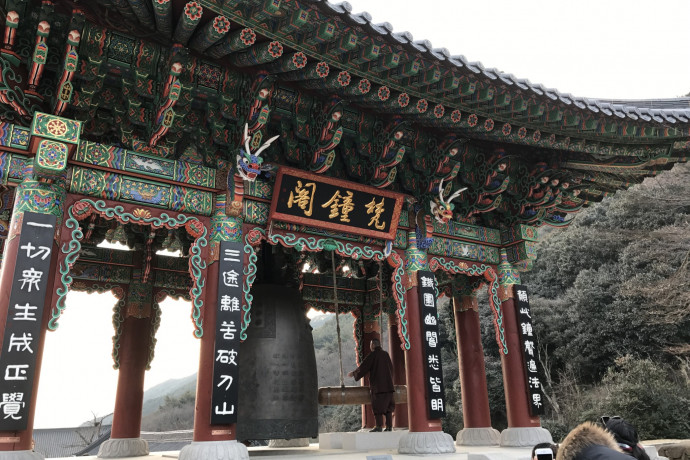 Caetano KjelstromCaetano Kjelstrom
Caetano KjelstromCaetano Kjelstrom -
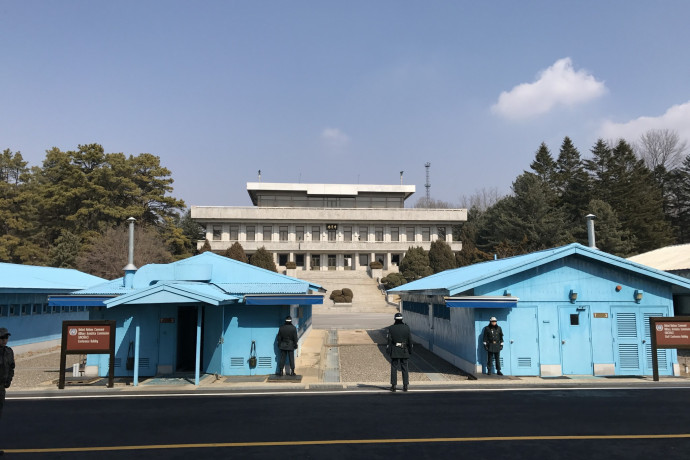 Caetano KjelstromCaetano Kjelstrom
Caetano KjelstromCaetano Kjelstrom -
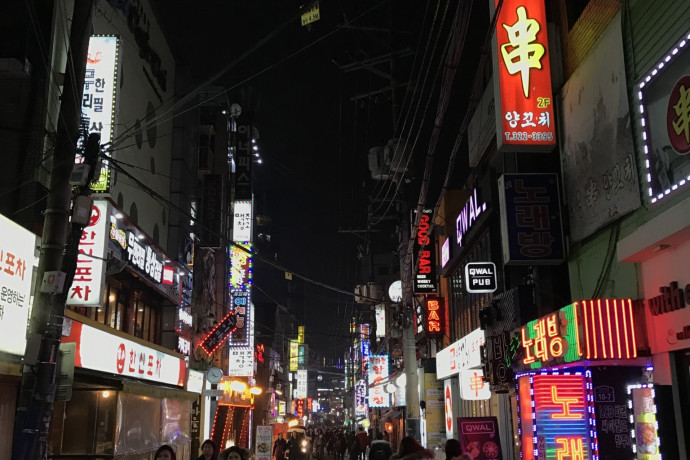 Caetano KjelstromCaetano Kjelstrom
Caetano KjelstromCaetano Kjelstrom -
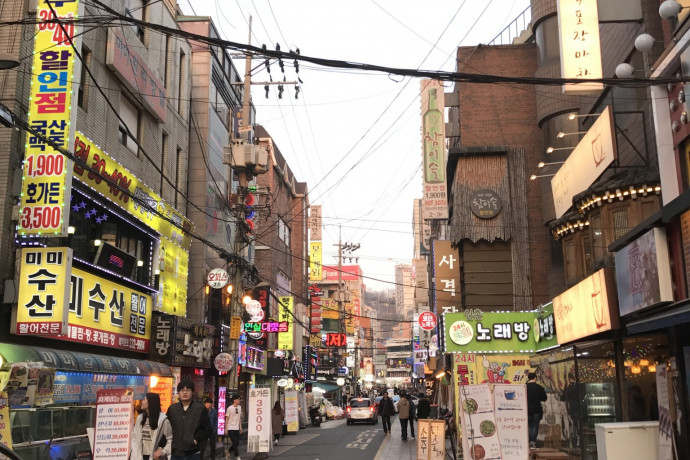 Caetano KjelstromCaetano Kjelstrom
Caetano KjelstromCaetano Kjelstrom -
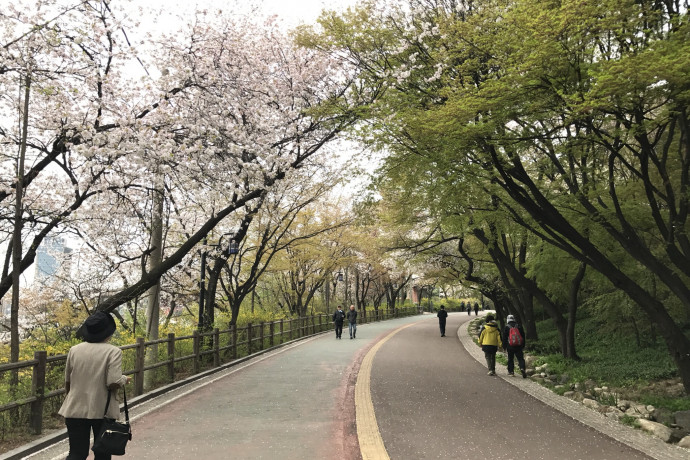 Caetano KjelstromCaetano Kjelstrom
Caetano KjelstromCaetano Kjelstrom -
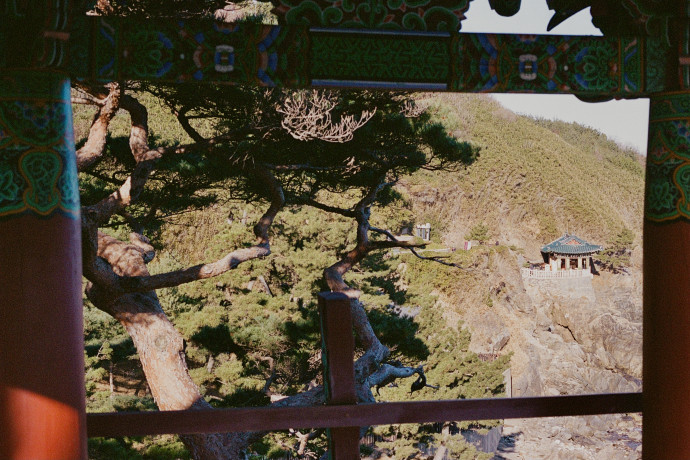 by Michelle Monheit
by Michelle Monheit
| Program Snapshot | |
| Semester: | Fall |
| Offered: | Annually |
| Estimated Dates: | Fall: Late August to late December |
| Program Focus: | Regional Area Study |
| Prerequisites: | AS 251: Contemporary Korean Culture. Other Asian Studies courses may be substituted with prior approval of Overseas & Off-Campus Programs Director. Minimum of 2.5 GPA. Students must satisfy the Words and Numbers CORE requirement before participating in an overseas program. |
| Housing: | Student apartments |
| Campus Contacts: |
Susan Glosser Associate Professor of History and Program Director, Asian Studies sglosser@lclark.edu, 503-768-7488 |
Program Design
In cooperation with IES Abroad, Lewis & Clark offers this program at Yonsei University in Seoul. Students live in apartments located near public transportation for daily commutes to campus.
This program features 15 weeks of courses in English and Korean with Yonsei University’s Division of International Education. The program also includes visits to places of cultural and historical significance in Seoul and around South Korea. Students have the opportunity to get involved in the community by volunteering at local organizations, joining a student club on campus, or becoming a conversation partner.
Situated on the Han River, densely populated Seoul is the capital and largest city in South Korea. This vibrant business and financial hub and cultural center is home to more than 100 museums, numerous religious monuments, parks and surrounding mountains, markets, festivals, sports teams, and tourist attractions including the Gyeongbok and Changdeok palaces.
Yonsei University is the most prestigious private institution of higher education in Korea. Founded in 1885, the school has 18 graduate schools, 21 colleges, and a student population of over 30,000, including more than 1,000 students from 20 countries. The university is located less than 20 minutes from downtown Seoul on a large sprawling campus that is hilly and forested.
Onsite Staff: The Program Manager of IES South Korea is Suyeon Lee. Suyeon Lee has been working as the University Relations and Counseling Manager for SAF Korea since 2021 and serves as the Program Manager for IES Abroad programs in Seoul. Suyeon has more than 10 years of experience in international education, including Lecture at Mongolia International University and Senior Admission Counselor at an international boarding school and a German university. Suyeon holds a Bachelor of Arts in English and Japanese Studies and a Master of Arts in Theological Studies from McMaster University, ON, Canada, and is currently studying for a Master of Business Administration at International University of Applied Sciences.
Recommended Pre-Program Course:
HIST 297: Intro to Korean History (4 credits) - taught by Susan Glosser
In this class we’ll explore key moments in Korea’s long history through philosophy, poetry, religion, art, trade, and material culture. The three periods we’ll focus on are Korea’s interactions with China in the years of Korea’s earliest development, its contact and clashes with Japan during the Medieval ages, and the country’s international and national history from the 19th century to the present. First year students welcome!
Other recommended courses:
- HST 110: Early East Asian History (4 credits) - taught by Andrew Bernstein
- RELS 242: Religions and Culture of East Asia (4 credits) - taught by Jessica Starling
- AS 410: Asian Studies Colloquium (4 credits) - taught by Jennifer Hubbert
Academics
Requirements Fulfilled:
General Education - This program fulfills the Global Perspectives general education requirement for students who successfully complete 8 or more semester credits.
Major Requirements: This program fulfills the overseas study requirement for the Asian Studies major.
Credits: Credits earned varies based on courses completed. Students may earn up to 19 credits. Overloads are not permitted.
Curriculum: In addition to an optional intensive Korean language class, students have access to a host of elective courses through direct enrollment at Yonsei University. Courses are offered in a wide range of subjects in the sciences, humanities, social sciences and the arts. All courses are taught by Yonsei University faculty. A sampling of the courses and course descriptions are available on the IES Seoul program page under the Academics tab.
Excursions: A number of excursions are built into the program, including visits to the DMZ, Jeonju Hanok Village, and Seoraksan National Park and Gangneung. In addition, special lectures and cultural activities are woven into the program throughout the semester, including visits to Korean organizations, museums, temples, and historic sites.
Student Life
Housing: During their semester in Seoul, students live in studio apartments that are conveniently located near public transportation for daily commutes to campus. Each apartment includes a kitchen.
Volunteering: Volunteer placements are encouraged and can be organized by IES. Past volunteers have worked with North Korean refugees, on a farm, and with the homeless community. Volunteering is a great way for students to get involved and be more connected to the host community.
Student Clubs: Students have the opportunity to join regular Yonsei University student clubs, which cater to a variety of interests, and many clubs are open to international students. The themes of these clubs range from music and dance to hiking, sports, and community service. Joining a club is a great way to get involved on campus and meet local students outside of the academic realm.
Cost
2023-2024 Fee Breakdown*
Total Fee (includes Tuition, Program Fee, and Health & Wellness Fee): $39,385
Tuition: $30,958
Program Fee: $8,390
Health & Wellness Fee: $37**
Included in the program fee are room/housing, board/meals, and administrative fees. Not included are airfare, passport and visa expenses, primary insurance coverage, photographs, books, immunizations, and incidentals.
*Fees are updated every February for the following academic year.
**The Health & Wellness Fee supports the operations of Wellness Services staff in delivering pre-program orientation services, as well as in providing health-related consultation regarding participant health needs. All students in the College of Arts and Sciences pay a mandatory fee of $37 per semester.
Stipend: Students will receive a stipend to cover the cost of meals and transportation costs not covered by the program fee.
Estimated Airfare (Round Trip PDX to ICN): $800 - $2,000
Estimated Travel Document Fees: $120 - $170
Estimated Health Insurance Fee: $1,943.50
All students participating in overseas programs are automatically enrolled in iNext, a supplemental travel insurance program. The fee for iNext is covered in the program cost. However, students are also required to have comprehensive health insurance during their time abroad. All students participating in overseas programs, both abroad and domestic, are automatically enrolled in the College’s student health insurance program. Similar to a regular semester on-campus, students participating in overseas programs may waive enrollment in the student health insurance program if they have other comprehensive health insurance (e.g., through a parent, guardian or employer) that 1) provides coverage for them in the geographic region in which they will be studying and 2) includes mental health benefits. Click here for more information regarding health insurance & overseas programs.
Program Preparation
Application Process: This program has a dual application process. Students must first submit a Lewis & Clark application. Once admitted by Lewis & Clark, the students will receive instructions for submitting their secondary, or program sponsor, application, and will receive a separate notification letter from IES. Please keep a digital copy of your essays and other application materials as you will need to submit these again to IES or you will need to re-write the essays. Please note that this secondary application process can be as late as the semester preceding your scheduled participation.
For more information about the application process, click here.
Travel: Students usually fly into the Seoul airport (ICN). Students arriving during a pre-arranged window of time will be greeted by the Seoul staff if they inform the staff in advance. Students who are unable to meet with the resident staff at the airport will receive instructions regarding where to meet the staff approximately 30 days prior to the program arrival date.
Visa: Students will be required to apply for a visa in order to participate in this program. More information will be provided upon admission to the program.
Country-Specific Health Information: Click here to view specific health information for people traveling to South Korea.
State Department Country Information: Click here to visit the State Department’s South Korea page.
South Korea
Overseas and Off-Campus Programs is located in room 206 of Albany Quadrangle on the Undergraduate Campus.
MSC: 11
email overseas@lclark.edu
voice 503-768-7295
fax 503-768-7300
Director Blythe Knott
Overseas and Off-Campus Programs
Lewis & Clark
615 S. Palatine Hill Road MSC 11
Portland OR 97219